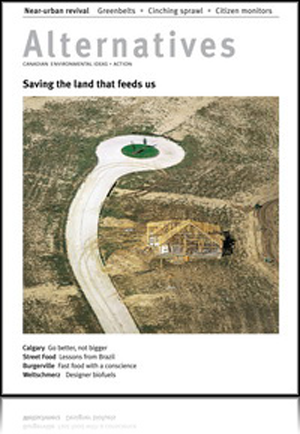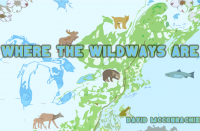Bill Rees says it best, “If you want sustainable cities, folks, they depend on sustainable countryside.” Yet the agricultural and natural lands that surround our urban centres are being systematically paved over and dug up to make way for housing, highways and industrial development.
Bill Rees says it best, “If you want sustainable cities, folks, they depend on sustainable countryside.” Yet the agricultural and natural lands that surround our urban centres are being systematically paved over and dug up to make way for housing, highways and industrial development.
In this issue of Alternatives, we explore how our near urban lands can become thriving, liveable places that grow our food, provide habitat for wildlife, give us space to hike and bike, and contribute to the overall health of our environment.
 Read selected articles and web extras from this issue
Read selected articles and web extras from this issue
Here’s what else you get when you buy the issue:
Bringing the Farm to the Inner City- Vivian Belik
How one CSA is improving food security in Winnipeg.
Growing Organic – Bob Burtt
Mennonite farmers are well suited for organic farming.
Clinching Sprawl – Maureen Carter-Whiney
Worldwide experience with greenbelts can help Calgary protect its near-urban lands.
Calgary in the year 2050 – Brad Stelfox
If Calgary’s annual growth in area (currently 4.5 per cent) were limited to its annual population growth (3 per cent), it would have a profound effect in reducing sprawl.
Saying No to Growth – Aline Comford
Okotoks, Alberta uses carrying capacity to shape its future.
Places to Grow – Niola Ross
The McGuinty government dictates where people will live.
Vote for De-suburbanization – Deborah Curran
New policies are key to reining sprawl.
+ The Urbanization of Southwest Richmond, BC (Youtube)
Review: Fleeting Opportunity – Michal C. Moore
Some Like it Cold: The Politics of Climate Change in Canada by Rober Paehlke
Street Food – Mairon Giovani Bastos Lima
Brazillian street vending nourishes the local economy and supports farmers.
Reviews – Andrew Heintzman, Terry Fenge
Brain Mulch: Weltschmerz – Gareth Lind
Publication of this issue was made possible by The Gosling Foundation; The Salamander Foundation; and the support from our many subscribers. We acknowledge the financial support of Canada’s International Development Research Centre (www.idrc.ca); EJLB Foundation; Friends of the Greenbelt Foundation; The McLean Foundation; Ontario Media Development Corporation; Ontario Trillium Foundation; Ontario Work Study Plan. We acknowledge the financial support of the Government of Canada through the Canada Periodical Fund (CPF) of the Department of Canadian Heritage toward our project costs. The support of the Faculty of Environment at the University of Waterloo and the Waterloo Environmental Studies Endowment Foundation is appreciated.’






 Read
Read 






